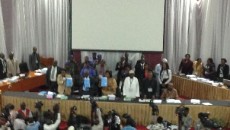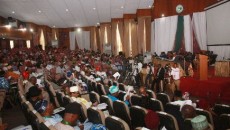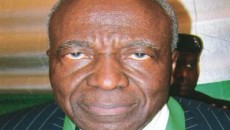It is business-as-usual at the National Conference, with the proposal for the creation of 18 states. The development puts a question mark on the commitment of the delegates because their proposal is not in tune with the reality that necessitated the conference, writes Deputy Political Editor RAYMOND MORDI.
NOTHING epitomises the incongru-ity of some of the National Confer-ence proposals, compared with the reality on the ground, more than the suggestion that 18 new states should be created to bring the number of states in the country to 54. Coming at a time when it has become obvious that the burden of the 36-state structure of is not sustainable and many Nigerians are calling for pruning down the number of the federating units and going back to regional autonomy, the idea of the increase is both ridiculous and laughable. “I am completely astounded that people are still agitating for the creation of more states,” Sam Ohuabunwa, an industrialist and former chairman of the Nigeria Economic Summit Group (NESG) said.
This is particularly instructive, considering the fact that the conference has been dubbed the antidote to disintegration. Many of the 36 states are not viable. They virtually depend on the monthly allocations from the federation account to pay salaries and remain afloat, with virtually nothing left for the development of the state. This has been compounded by the dwindling allocations accruing to the states in recent times.
To many observers, the fact that such a proposal sailed through, considering the high consensus parameter of 70 per cent adopted by the conference, shows that majority of the delegates are not in tune with the reality.
But, the proposal to create more states may not come as a surprise to discerning observers. Over 70 per cent of the delegates are above 70 years and they are mostly people who have occupied leadership positions in the past. King Alfred Diette-Spiff, the traditional ruler of Twon-Brass, Bayelsa State, who is a member of the National Conference, throws more light on the composition of the conference: “The composition of the conference is quite formidable; you have former governors, former Presidents of the Senate, former Speakers, former chief justices, former retired justices of the Supreme Court; you have everybody, all the way down to the people from the National Youth Service Corp (NYSC) and civic and trade-based societies,” he said.
As far as Diette-Spiff is concerned, Nigeria is in a bad dream. “It is like we are being chased by the buffalo. we tried to run, but we are being knocked in the feet. This conference is a wake-up call; after it, it may not be so golden again,” he added. Diette-Spiff was the governor of Rivers State from May 1967 to July 1975 during the military administration of Gen. Yakubu Gowon.
The import of the proposal for more states, going by the desperate picture painted by the former governor, is that the country is yet to wake up from its slumber and the elite class are still fiddling, while the country is on the verge of collapse. Senate Leader Victor Ndoma-Egba, linked the country’s economic backwardness to the creation of numerous states by the military. He said Nigeria was more focused and tilted towards the direction of development when she had four regions in the ‘60s and 12 states in the ‘70s. His words: “As at 1965, when we had four regions, Nigeria’s economy was at par with that of Brazil, Malaysia, Indonesia and other countries. Now, those countries have maintained those same structures and we have increased ours on the pretext of development.”
In contrast, India, the world’s second most populous nation, with a population of 1.22 billion, has a federal structure with only 28 states. Indeed, Uttar Pradesh, one of the states in the northern part of the country, has a population of 200 million; far beyond Nigeria’s 150 million. The sub-continent of India is also the world’s seventh largest nation, with a landmass of 3,287,590 square kilometre. Similarly, China, the world’s most populous nation, with 1.34 billion citizens, and the third largest by landmass, has 34 provinces. Nigeria is the seventh most populous country in the world and the 31st in terms of landmass.
The Chief Executive Officer, Nesbet Consulting, Dr. Alaba Olusemore argued that creation of more states would not be in the country’s favour, as it would not necessarily bring about development. “What will bring development is visionary leadership that can galvanize the creative energies of the people and one that can harness the available resources of the state,” he noted, adding that any new state that is created can only increase the country’s overall recurrent expenditure and slow capital growth in the federating units.
Former President of the Nigerian Bar Association (NBA), Olisa Agbakoba, who is a delegate to the conference, said he never agreed with the recommendation because most of the states were not self-dependent. “I am a member of the National Conference, but I don’t agree with the decision that we should create more states. I don’t understand why the need to create more states is to bring development to the grassroots. But where are going to stop? You create state in Asaba, you create in Onitsha, you create in Aba and other states in Nigeria. I don’t support it personally, because we can’t keep on creating states in Nigeria. Many of the states we have are not viable. So, if we keep creating states, I don’t know whether we are thinking about future sustainability of Nigeria,” he said. Agbakoba, a senior advocate of Nigeria (SAN), added: “The real thing we need to look at is how we can use our resources to develop Nigeria? And the only way to do that is to devolve powers to the regional systems.”
The call for the creation of new states has been recurring. For instance, the National Assembly, has been hinting for several years now that more states are in the offing. The agitation for creation of new states started with the arbitrary creation of 12 states in 1967 by Gen. Gowon, to frustrate the secessionist bid by the defunct Eastern Region under the leadership of Lieutenant-Colonel Chukwuemeka Odumegwu-Ojukwu.
Since then the number of states have been altered from 12 to 19 in 1976; to 21 in 1987; 30 in 1991; and 36 in 1996. Even at that, the agitation has not abated. There are agitations from all the six geo-political zones. The Southeast, for instance, has been consistently asking for an additional state to bring the number of states in the zone at par with that of other geo-political zones. The Southeast has only five states while the other zones have six states. The Northwest has seven states. Beyond that, there are agitations for states such as Aba, Etiti, Njaba/Anim and Wawa.
This is in spite of the recommendations of the Willinks Commission of 1957, which considered the state creation and the minority question and arrived at the conclusion that it would be counter-productive to create a new region out of the defunct Eastern Region because of the contiguity of the ethnic boundaries. The commission said it was both impractical and in the long run unsustainable.
As hinted above, the creation of new states was initially driven by the need to address perceived domination of ethnic minority communities by the majority. Later the underlying principle for demanding for new states changed. The underlying reason for such agitations now centre around the belief that additional states will translate to enhanced share of the federal revenue and opportunities in federal public service, which is shared on the basis of equality.
Experts say the proponents of these new states are not considering the interest of the people, but are merely looking for avenues for a bigger chunk of the national cake. The National Publicity Secretary of the Afenifere Renewal Group (ARG), Mr. Kunle Famoriyo, said it is ironic that Nigeria is the only country that is running what he described as ‘feeding bottle’ federalism. He said the answer to the developmental problems facing the country is regional autonomy. “Things would never change as long as we continue go to Abuja to collect allocation. This ‘feeding bottle’ economy cannot save us. God is not wrong to have brought Igbos, Hausa-Fulanis, Yorubas and other ethnic nationalities together to live as one. We are playing a different god, by saying that the basis of our unity should be for everybody to go to the centre to collect monetary allocation,” he stressed. This tendency, he added, has been dragging the country back because it has bottled up the creativity that is embedded in the individual Nigerian
Besides, creating more states would entail setting up administrative structures that would end up consuming more of the country’s resources that ought to be directed towards development. Even with the current 36-state structure, experts have suggested the transforming of the six geo-political zones into the federating units that would be autonomous. For the fallout of the 36-state structure, as well as the presidential system of government adopted since 1979 has become a drainpipe to the coffers of the nation; it is catering for the needs of individuals, instead of catering for that of the larger society.
Take the executive arm of government for instance. At the federal level, the number of personnel required to run the system is too large for an economy that is still struggling to find its feet. The list includes the president, the vice president, about 43 ministers and about 133 personal aides, as well as an unwieldy number of ministries, departments and agencies, MDAs, all drawing mouth-watering salaries and allowances from the national treasury. For instance, about 133 personal aides service the president, the vice-president, as well as the first lady. These aides, who are mostly political appointees, include the Chief of Staff to the President, Deputy Chief of Staff to the Vice President, Principal Secretary to the President, Principal Secretary to the Vice President, 25 special advisers, 42 senior special assistants, 52 special assistants and 12 personal assistants.
A similar structure is in place at the state level. The list here includes the governors, their deputies, about 15 commissioners on the average, a horde of special assistants and advisers, MDAs with thousands of civil servants on government payroll. In fact, the number of special advisers engaged by Isa Yuguda, governor of Bauchi State, during his first term is very instructive here. Yuguda had as much as 1,200 special advisers on the payroll, many of which do not have personal offices.
The wastefulness is replicated in the National Assembly, which is bicameral, with 360 members in the lower house and 109 in the upper house. The legislators themselves have hundreds of special assistants and administrative staff, all earning billions of naira in salaries and allowances from government. Commenting on the legislators’ mouth-watering salaries and allowances in Abuja during the nation’s 51st independence anniversary, Richard Dowden, a British journalist, had described as unacceptable the fact that Nigeria, a country with 10 per cent of the world’s maternal and child mortality and 10 per cent of the world’s children out of school, has the highest paid politicians in the world. “One million dollars for a parliamentary salary with another one million dollars in expenses is obscene,” noted Dowden.
George Oguntade, retired Supreme Court judge, had argued at a seminar to mark Nigeria’s attainment of 10 years of civilian rule in 2009 that, with the way things are going, Nigeria cannot operate the existing 36-state structure and make progress.
Be that as it may, there is also the perception that the centre is getting more than its fair share of the cake, and that this is depriving the federating units of critical funds required for development. Ikechukwu Unegbe, a writer and legal practitioner, who echoed this view, said Nigeria’s revenue allocation formula top-heavy, and requires urgent review. “This structure breeds poverty and lack of development within her federating units, comprising of states and local government areas,” he noted, adding that the entire system should be remodelled to reflect the principle of true federalism.
Source: The Nation Online



